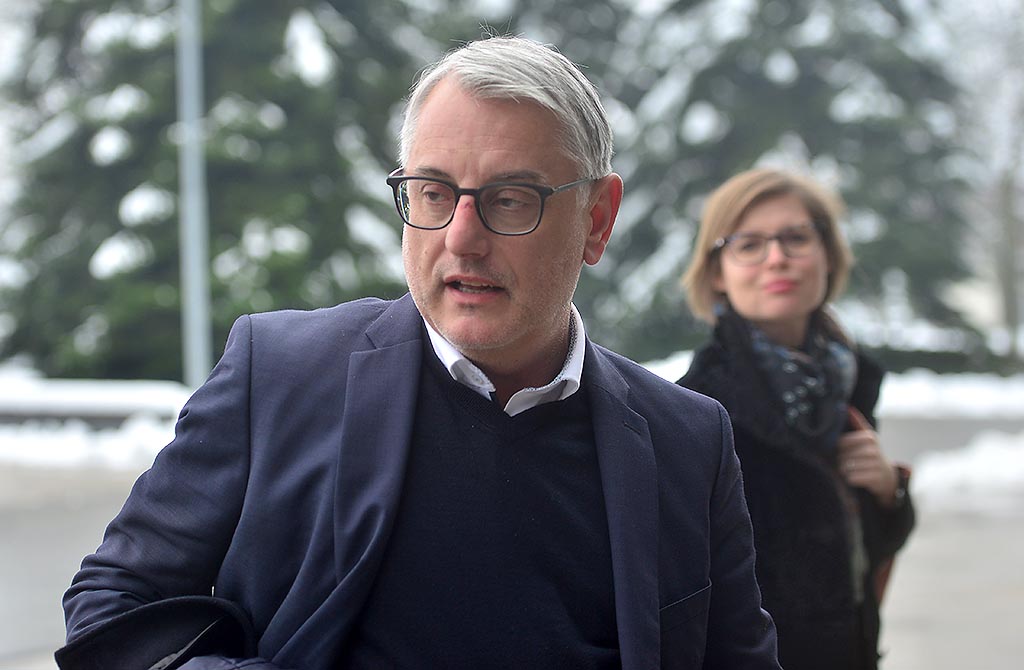Piše: C. R.
The president of SD, Matjaž Han, stated at a press conference that SD is demanding a repeat of the selection process for the position of General Director of the Police before the interpellation of Minister of the Interior Boštjan Poklukar, as this is “the minimal standard the police deserve”. Han added that Poklukar, who currently lacks the support of SD, will visit the parliamentary group on Tuesday.
“I don’t know if he can convince us without redoing the call for applications,” Han said about Poklukar today. He emphasised that they would insist on this, as “everything else is just political calculation”.
Abstention considered…
For now, SD is considering abstaining from voting on the interpellation. Han clarified that at this time, “there will not be any votes from the Social Democrats to reject the interpellation,” but added that they also currently do not plan to support the minister’s dismissal. If the selection process for the General Director of Police is not repeated, “that will be a new development,” and they will reconvene to decide how to proceed further.
The interpellation against the Minister of the Interior was filed in November by opposition and independent MPs. This came after the Administrative Court found procedural violations in the appointment of Senad Jušić as General Director of Police, specifically a lack of adequate explanation in the decision of the special selection commission. Meanwhile, both Poklukar and Jušić maintain that the latter’s appointment was lawful.
As reported by N1 on Friday, the Civil Service Council decided to request permission to appeal part of the court’s ruling that declared Jušić’s qualifications decision unlawful. The council cited a “significant procedural violation in the administrative dispute” as the reason for the request. However, the exact nature of the violation was not disclosed. Han also addressed broader current issues and the state of the coalition and government, which he expects to complete its mandate, though he foresees a challenging period ahead within the coalition.
Discontent with the coalition
Regarding housing for young people, he stated, “Simply raising taxes will not bring the solutions young people want.” Among potential solutions, he highlighted simplifying procedures for obtaining building permits and proposed that developers building “large and expensive apartments” allocate 10% of those for social housing. “I think we will have a lot more discussions about the property tax,” he said, noting that SD still has “a lot to say” on the matter.
On pension reform, Han emphasised the need for caution, admitting that past attempts had resulted in mistakes. After consultations with social partners and retirees, SD will determine “key milestones” to ensure a fair pension system in which young people can also have confidence.
He admitted he had only “skimmed through” the recently adopted Media Law, noting that the Ministry of the Economy had some additional proposals to support more media outlets. He explained, “But I definitely was not reading laws or voting on December 31st,” adding that this does not absolve him of responsibility. He criticised the timing of passing such laws during the holidays and said he had expressed his concerns to Prime Minister Robert Golob and Culture Minister Asta Vrečko.
He indicated he would support the government’s proposal to dismiss the remaining members of the Energy Agency’s council, even though it is an independent body. He believes that it is clear there is something wrong with it, while acknowledging that “some of the responsibility also lies with the government.”
On the appointment of the Governor of the Bank of Slovenia, Han was optimistic, but he anticipated more difficulties with appointing the Ombudsman, which requires 60 votes in parliament. “Here we will all need to put our egos aside – this includes the President of the Republic and all political parties – to make a decision for the sake of the country’s institutions, which we need,” he said. He also confirmed to President Nataša Pirc Musar that SD is willing to cooperate on this issue.
Turning to healthcare, he admitted, “I cannot promise any more that we will fix public healthcare in one month.” He acknowledged that some of SD’s pre-election promises had been mistakes, as they were made without concrete solutions. He stressed the importance of engaging with “outstanding professionals in healthcare” to find solutions.
He also criticised the mandatory health contribution, continuing to advocate for progressive taxation. “The problem here lies partly with the ministry for not implementing it, and also with the changes in leadership at the health insurance fund,” he added.
Additionally, he highlighted the importance of digitisation, noting that it “is not just about moving equipment from one warehouse to another.”
On NATO membership, Han expressed full support for collective security. “But if you are not capable of taking care of yourself, then you have to question how much you can rely on others and what you can contribute to collective security,” he said. He emphasised the need for a reliable and effective security system to address a wide range of global threats, particularly pointing to the genocide in Gaza and the war in Ukraine. He called for collective diplomatic efforts to achieve peace, which can only be reached through dialogue.
He stressed that his criticisms are not intended to undermine the government. He assured that SD will “carry out its duties responsibly and professionally until the end of this term.” However, they are also preparing for the period after this government, which, while achieving some successes, “is unlikely to fulfil all its promises and people’s expectations. We need to be honest about this,” he added.
As for coalition relations, Han said he sometimes misses “a bit more respect for a party that has worked hard for 30 years,” specifically from some coalition partners.
If SD abstains from the interpellation vote, it means there will not be enough votes to pass the interpellation, maintaining the current status quo.

